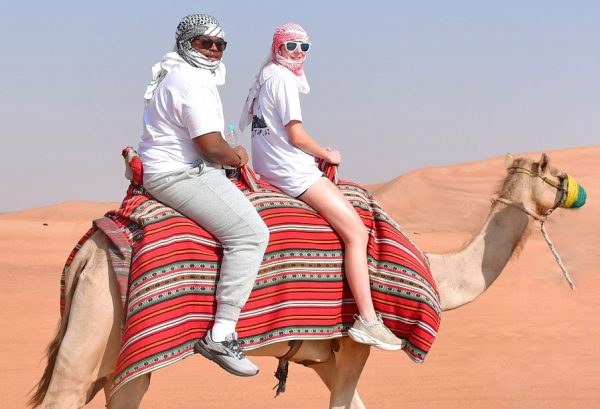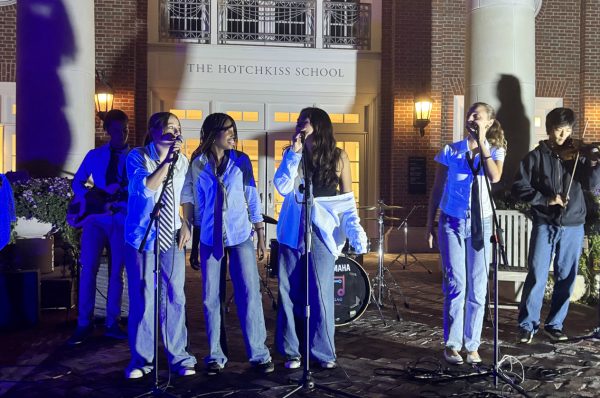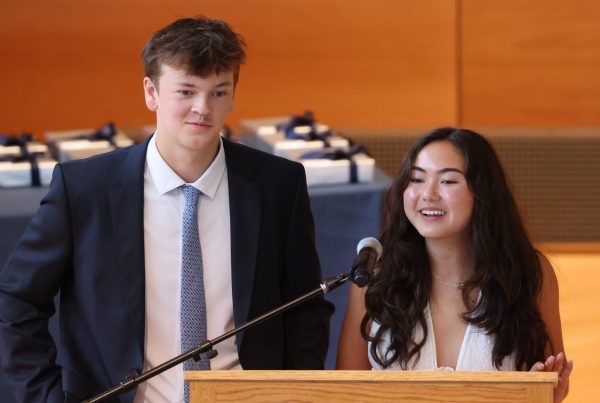Model UN Competes at Yale
For debate team co-captain Annabelle Duval ’19 and other Senior team members, this will be their fourth and final trip to the annual Yale Model United Nations Competition. Today, the Model UN team will arrive at Yale University, ready to debate pressing global issues in the same classrooms that have inspired presidents, prime ministers, and politicians.
Yale Model United Nations (YMUN) is an international political relations simulation for high school students, held annually at Yale University in New Haven, Connecticut. This year, from January 17 to January 20, approximately 2,000 students will take on the roles of UN representatives, members of important international organizations, and policymakers and work to solve real-world challenges.
In October, Duval and her co-captains, Ian Gill ’19 and Carolyn Ren ’19, received more than 60 applications from the student body for the team. The captains looked for leadership, collaboration skills, and specific background in relevant topics from the candidates. In conjunction with Debate Coach David Conti, instructor in classics, Debate Coach Paula Russo, instructor in history, and Mr. Thomas Fisher, instructor in history, the captains selected 20 students to attend the 45th annual conference. Starting before the winter break, the delegates met each week to review Model UN procedures, practice speaking skills in mock debates, and write position papers, which define the delegates’ stances on relevant issues. Duval said, “I will miss the preparation process. Talking to each other and asking for advice from others to work through our own issues is a really helpful process. There is a camaraderie between everybody on the team.”
Based on their knowledge and interests, the delegates serve on different committees – from Economic and Social Councils such as the World Health Organization, to regional bodies such as the Association of Southeast Asian Nations. They tackle a variety of global issues, such as humanitarian aid, the South China Sea border dispute, and carbon pricing.
At the conference, delegates will conduct formal speeches and debates in moderated caucuses. In unmoderated caucuses, after drafting and presenting their resolutions, candidates will vote on the final resolution for the committee. Stella Ren ’22, a Model UN team member, said, “MUN is a combination of a lot of skills. People think it is just debate, public speaking, or writing, but there is also a lot in diplomacy and working on resolutions with other people. There might be disagreements, so you need to learn to build healthy connections with people, and at the same time try to deal with situations that might be difficult.”
The 20 delegates will represent a variety of countries, including France, Haiti, Portugal, The Bahamas, and Malaysia. Additionally, three delegates will represent politicians – former United States Secretary of State Henry Kissinger, Turkish President Recep Tayyip Erdoğan, and Chinese Vice Premier Liu He. Duval said, “One of my biggest takeaways is to learn about the opinions of a country that is not your own, and to see the stances that different countries take.”
On the last day of the conference, its organizers will distribute trophies and certificates of achievement in categories such as Best Delegate, Outstanding Delegate, and Honorable Mention. Mr. Conti, who has coached Model UN for seven years, said, “All delegates [will] learn to understand the way that policy works in the big picture. How to negotiate, make a difference, and get your resolutions passed is something that everybody has to learn. When you look at what is going on in the government today, people are having a really hard time learning to negotiate. Our kids get to learn that and I think [it is an] important skill.”




